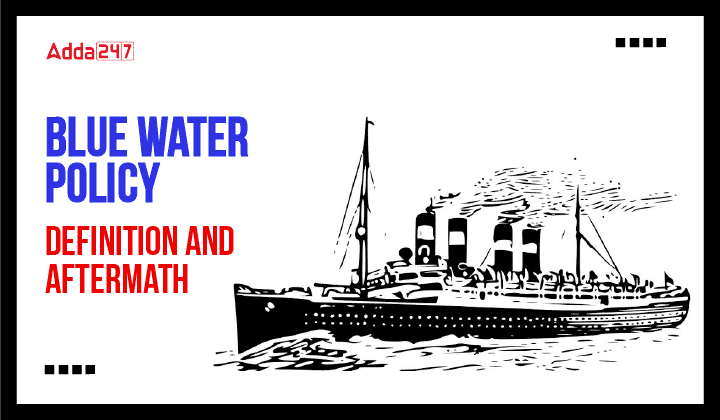Table of Contents
The Blue Water Policy, developed by Francisco De Almeida, was a strategy implemented by the Portuguese amidst the massive colonization race between the European Nations for acquiring territorial superiority in India. Blue Water Policy is one of the most important witnesses in the recent teaching competitive exams lisk kVS, DSSSB, NVS and CTET. To understand the concept and it implications, read the following article carefully and completely.
What is Blue Water Policy?
Blue Water Policy was proposed by Francisco de Almeida in 1905. This strategy stand out in the History as it was propose naval and maritime supremacy by the Portugues rather than focusing on the control over the Land. The Blue Water Policy was the fortification of the Indian Ocean, not for security but for the establishment of Portuguese business in the Indian Ocean.
Francisco de Almeida wanted the Portuguese to maintain supremacy on the sea and confine their activities to purely commercial transactions and to realize his vision he implemented the Blue Water Policy.
Blue Water Policy – Highlights
Francisco de Almeida, the Viceroy of Portuguese territories in India, opposed the establishment of a territorial empire there and preferred that the Portuguese maintain maritime dominance and restrict their activities to exclusively economic ones. The Blue Water Policy is the name given to this. Some of the highlights enlisted under this policy were:
- In 1505, King Ferdinand I of Portugal appointed a three-year governor in India and gave him enough troops to defend Portuguese interests.
- The newly appointed governor, Francisco De Almeida, was tasked with consolidating the Portuguese position in India and getting rid of the Muslim commerce by capturing Aden, Ormuz, and Malacca.
- When Francisco de Almeida arrived at Cochin on October 31, 1505, just 8 ships had left.
- While he was there, he discovered that the Portuguese traders at Quilon had been massacred. He sent his son Lourenço with six ships to attack Quilon’s harbor, where they indiscriminately sank Calicut boats.
Blue Water Policy – Execution
With this approach, Francisco De Almeida hoped to make Portugal a strong nation in the maritime world.
- He replaced the Sultan of Bijapur as ruler of Goa.
- Albuquerque was succeeded by Francisco De Almeida in the year 1510 A.D.
- Goa later rose to prominence as the center of Portuguese settlement in India.
- The Portuguese in India were able to flourish thanks to the Navy’s authority and control over the coastal areas.
Blue Water Policy – Consequences
A chain of events ensued post the emergence of the Blue Water Policy. Some of them have been mentioned below:
- Almeida received instructions to fortify Cochin and Anjadiva.
- On the other side, Kilwa and Cannanore Almeida had to contend with the Mamluk Sultan of Egypt as well as the Zamorin’s resistance.
- The merchants of Venice, whose thriving commerce was now in risk due to Portuguese involvement, encouraged the formation of an Egyptian navy in the Red Sea to fight the Portuguese advance.
- Almeida’s son was killed when the Portuguese squadron was defeated by the combined Egyptian and Gujarati navies off the coast of Diu in 1507.
- Almeida destroyed both ships the next year to exact revenge for his loss. Portuguese dominance over the Indian Ocean was Almeida’s ultimate goal.
- His guiding principle was the Blue Water Policy (cartage system).
- Almeida died in a conflict with indigenous peoples at the Cape of Good Hope in 1510, before returning to Portugal. Lourenço de Almeida, his only son, had previously been killed in the Battle of Chaul.
Conclusion
Almeida is credited with establishing Portuguese dominance in the Indian Ocean with his victory in the 1509 naval Battle of Diu. Before traveling back to Portugal in 1510, Almeida was killed in a clash with locals close to the Cape of Good Hope. His only son, Lourenço de Almeida, had died in the Battle of Chaul.



 UGC NET Notification 2025 Out, Exam Date...
UGC NET Notification 2025 Out, Exam Date...
 CSIR NET Cut Off 2025, Download Subject ...
CSIR NET Cut Off 2025, Download Subject ...
 CSIR NET Scorecard 2025 Out, Download Re...
CSIR NET Scorecard 2025 Out, Download Re...














